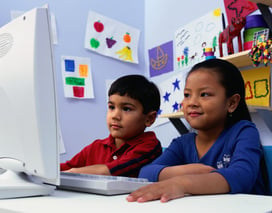As NAEYC stated in a policy statement issued on January 2012, “technology and interactive media are here to stay.” However, there remain many questions as to whether technology use with children in early childhood settings is beneficial or harmful to their development.
Don’t Forget the Pedagogy

Having worked with schools in their technology integrations and witnessed the rise of social media use, interactive whiteboards, and one-to-one computer–student usage within schools, I can tell you that there is much room for improvement.
The biggest problem is that the installation and use of technology is seen as the end goal, with little thought given to operational efficiencies or, more importantly, pedagogical benefits. Often, little to no training is done for teachers to help them not just use the technology but understand how to use it in a way that improves learning outcomes.
Along with this, there is a growing realization that our assumptions regarding “digital natives” are largely wrong. They have no deeper or more advanced understanding of the technology they use than those born in earlier generations. They are simply more used to being surrounding by it.
Developing Digital Literacy
Far more important than access to technology in classrooms is the development of digital literacy in our children. For example, the Internet has always been a wild west of sketchy information, with Americans becoming much more aware of this in relation to the proliferation of "fake news."
Yes, we want children to learn how to type, navigate their way around a PC, or know how to use YouTube to teach themselves how to do something. However, our real goal as educators is to give children the skills to understand when and how to use these tools to achieve their goals in a safe and responsible manner.
Not All Media is Created Equal
As part of a Child Trends panel discussion covering toddlers, preschoolers, and digital media, New America Foundation’s Lisa Guernsey made the following statement: “Instead of just thinking about the amount of time children might be spending with a device, or with a box that has images on it, we should be looking at the three Cs. … Let’s look at the content: what are they seeing on the screen … or what are they playing with? What about the context: who’s around the child when they’re experiencing this, and how is it fitting into their daily routines? … The third C is your child … you have to really tune into what some children are more prone to do with media, the way they’re using it or experiencing it, becoming upset by it or becoming fixated on it, and other kids are going to be completely different.”
What’s Needed?
Digital literacy means many things. It means helping children understand their digital footprint and how everything they post online is forever stored and accessible. It means teaching them how to communicate with others using social media appropriately in a way that is not bullying or in a way that helps them achieve educational and professional goals. It means helping children understand that not everything on the Internet is real and how to critically evaluate any information they come across.
These digital literacy skills can start in our child care and preschool classrooms. It can be as simple as reading a story about bullying and discussing with students why it’s not OK to do this in the class or when using a computer. We can show images to students of real animals and mythical animals on the computer and ask whether everything they see on the computer is real.
Nick Jaworski is the Owner and Chief Digital Community Builder for Circle Social Inc., a digital marketing agency that helps schools and other organizations leverage digital media to achieve organizational goals. If he’s not online, you can find him playing with his favorite person in the world, his daughter. You can follow him on Twitter, Instagram, or Snapchat @NBJaworski.
This post was originally published in January 2017 and has been updated for accuracy.





